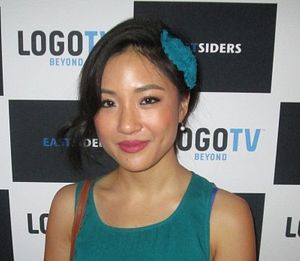Last week Taiwanese-American actress Constance Wu, who plays the mother in the hit comedy series “Fresh off the Boat,” slammed the upcoming Matt Damon film The Great Wall as yet another example of racial prejudice in film.
The movie’s trailer hit YouTube last week and by the looks of it, the story is set during the Northern Song dynasty, the Great Wall exists to keep out dragons, and Matt Damon and Pedro Pascal play dragon-slaying saviors.
“We have to stop perpetuating the racist myth that only a white man can save the world,” Wu tweeted in a letter on Friday.
But the problem is more nuanced than Wu’s letter, or media reactions to it, suggest. For one thing, Pascal is Latino, and some consider that a separate category from white (others would argue that to be white is just one type of Latino).
More to the heart of the matter, Terence Hsieh extolls the film as a collaborative stepping stone and rejects the notion that this is yet another case of Hollywood whitewashing. And he’s right, because the film is neither made by Hollywood nor does it contain whitewashing.
Whitewashing is when white actors play nonwhite roles: Josh Hartnett as an Inuit sheriff in 30 Days of Night, Benedict Cumberbatch as the Indian Khan Noonien Singh in Star Trek Into Darkness or Liam Neeson as the Arab Ra’s al Ghul in Batman Begins.
The Great Wall is not an example of this, but then Wu never said it was. Her letter doesn’t mention whitewashing, but instead hits upon another rampant form of racial prejudice in film, the white savior narrative. Behold Avatar, Blood Diamond, Dances With Wolves, District 9, Elysium, The Last Samurai, The Matrix—the list goes on and on.
Anticipating critics who’ve said the studio cast Damon simply to reach a wider audience or that both the studio and the director, Zhang Yimou, are Chinese, Wu remarked, “Money is the lamest excuse in the history of being human. So is blaming the Chinese investors. (POC’s choices can be based on unconscious bias too).”
Wu speaks directly, and intelligently, to the concerns of many. And she manages it in a way that’s both ferocious (“white people are superior…you ARE saying that…yes dude, you fucking ARE”) and yet touching (“we WERE those kids…you WERE that nerdy white kid…that’s why it moved you”).
She doesn’t, however, address the fact that the white savior narrative plays into a structure of systemic racism that doesn’t exist in the same way in China, because in China the ethnic group that has historically oppressed minorities, held political and economic sway, and dominated mainstream culture is not whites, but Han Chinese.
Neither does she reflect on what mainland Chinese might think about an American, a Taiwanese American at that, attacking a mainland Chinese film for violating American sensibilities concerning racial representation in media.
As an American, I wholeheartedly agree with her when it comes to Hollywood. But when it comes to China, Beijing is already vilifying Western influence and aggressively encouraging nationalist sentiment. It’s even turning its back on other Asian influences; Hunan TV recently issued orders for all scenes with Koreans actors to be cut.
In this frightening atmosphere, the last thing we need is for China to start making fewer movies featuring non-Chinese heroes. Had the studio hired Chinese-American actors, it wouldn’t have been collaborative in the same way because Chinese may have viewed them as ingroup members. Yet Wu seems unconcerned with that problem.
“Our heroes don’t look like Matt Damon,” she says. “They look like Malala, Gandhi, Mandela.”
Here I can’t help but think, why not all of the above? Why don’t Wu’s heroes look like Albert Schweitzer, too? Is it merely because they’re white?
To be fair to Wu, a single letter doesn’t capture her richly nuanced and careful understanding of Asian-American representation in media. Still, she is speaking from a decidedly American perspective, which raises questions about the extent to which American values are universal, or which ones ought to be. Eddie Huang, the restaurateur upon whose memoir Wu’s comedy show is based, once said: “It’s really weird when dominant culture comes to tell you what to be mad about. Don’t tell me what needs to be offensive to me.”
And the thing is, for many Chinese, America is the dominant culture, which places Wu’s otherwise brilliant critique in a precarious perch. So while her her message is vital, when applied to China it feels ever so slightly out of context, which is not to say we can’t be happy about China’s artistic collaborations with the West while also critiquing the white savior narrative. Indeed we must. But it’s worth reflecting along the way whether we’re preaching to the choir.

































